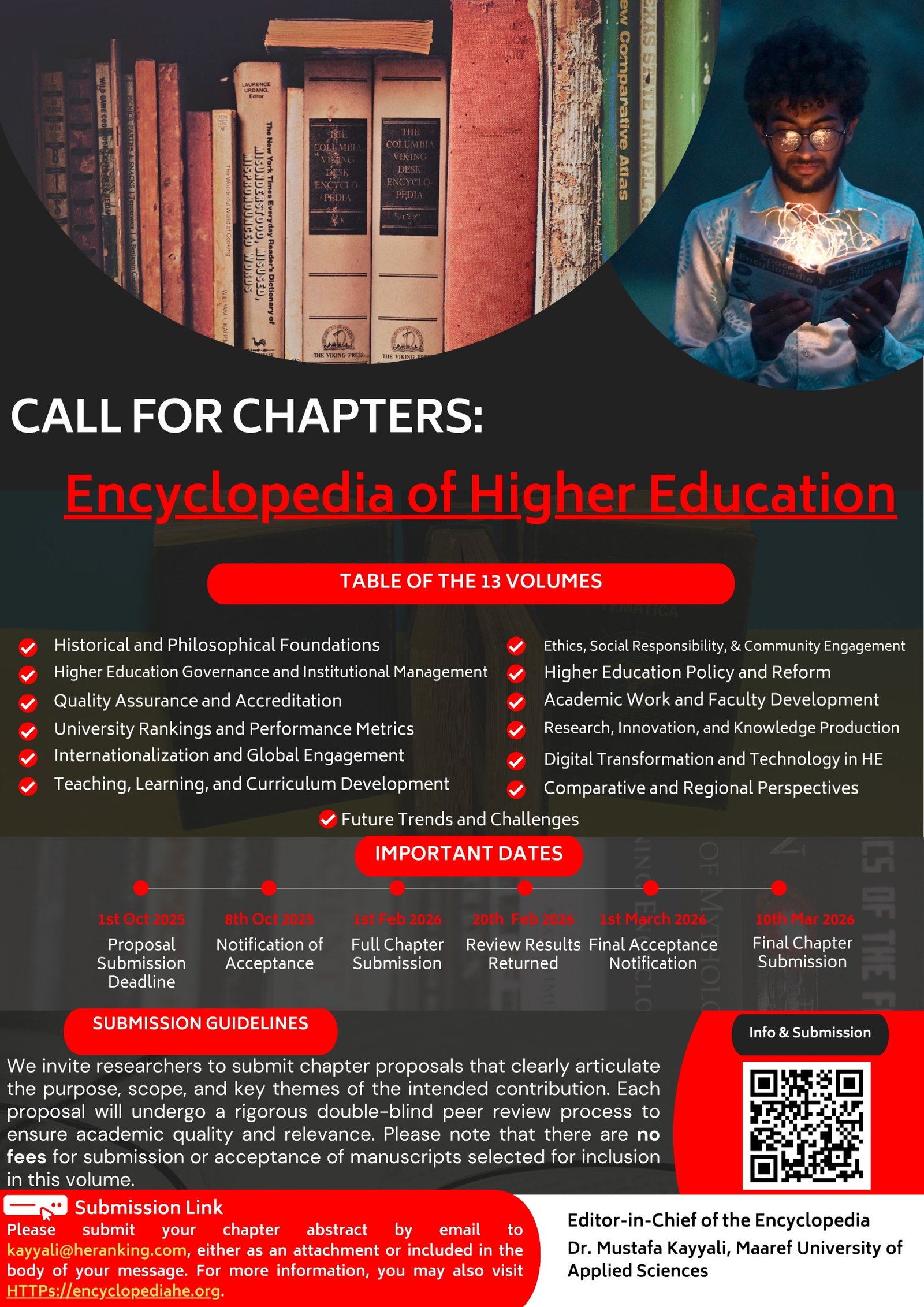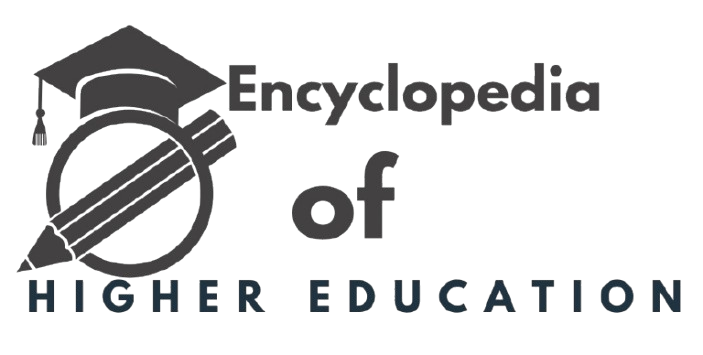Why This Encyclopedia?
Justification
The global landscape of higher education is evolving at an unprecedented pace. Forces such as digitization, political upheaval, internationalization, climate change, and economic restructuring are transforming how universities operate, educate, and engage with society. Yet despite this massive flux, most existing academic references remain fragmented, regionally biased, or too narrowly specialized to provide a truly holistic understanding of global higher education systems. The *Encyclopedia of Higher Education* emerges as a response to this critical void. It is not merely an academic collection, but a deliberate intellectual endeavor to consolidate global knowledge, bring underrepresented voices to the fore, and create an enduring platform for comparative inquiry and cross-border dialogue. Rather than privileging dominant models from the Global North, this project gives equal space to institutions, thinkers, and innovations from the Global South, post-conflict regions, and emerging education systems. In a world where education is often treated as a tool of geopolitical soft power or economic competition, this encyclopedia reasserts its role as a public good and a force for collective progress. It challenges siloed thinking and encourages a nuanced understanding of how higher education serves communities, nations, and humanity at large. From the Humboldtian research university to Indigenous knowledge traditions, from digital campuses to ethics in artificial intelligence, this encyclopedia embraces complexity and embraces multiplicity. It is a project that believes in knowledge equity, in the dignity of diverse academic experiences, and in the power of documentation to inspire transformation. It is, at its core, an act of academic diplomacy and scholarly solidarity.
Importance
The Encyclopedia of Higher Education is more than a collection of academic entries—it is a living mirror to the state, soul, and future of universities worldwide. With contributions from over 80 countries, including ministers of education, university presidents, policy analysts, researchers, and practitioners, it reflects a rare fusion of strategic depth, scholarly rigor, and real-world insight.
At a time when higher education is under increasing scrutiny—facing questions about cost, equity, employability, political influence, and societal relevance—this encyclopedia offers clarity. It provides institutions, policymakers, and scholars with an authoritative reference that is globally inclusive, contextually grounded, and thematically forward-looking.
What sets this project apart is its capacity to connect the dots between disciplines, geographies, and sectors. Whether you’re an accreditation agency rethinking quality frameworks, a ministry developing new policy tools, a university designing cross-border partnerships, or a doctoral student mapping out your research field—this encyclopedia serves as your compass.
It enables new paradigms to emerge by presenting old challenges in new light: how to measure impact without reducing education to numbers; how to internationalize without colonizing; how to reform without losing tradition. It is also a critical tool for thought leadership in areas like ethics, sustainability, digital transformation, academic freedom, and social justice.
Importantly, it democratizes knowledge: free to access, free to contribute, and free to distribute—symbolizing a true commitment to open scholarship. By amplifying underrepresented regions and thematic areas, it actively reshapes the global conversation on what higher education is, and what it should become.
Ultimately, this encyclopedia doesn’t just inform—it empowers. It positions higher education not as a passive respondent to change, but as a visionary architect of the world we hope to build.
Interested in Contributing?
Researchers and authors who wish to participate in the Encyclopedia of Higher Education project are invited to send their abstract, chapter idea, or full submission directly to: kayyali@heranking.com
Alternatively, you may fill out the following form to express your interest and submit your proposal.

Reasons for Publishing This Encyclopedia
1. Global Coverage – Contributions from over 80 countries, showcasing diverse systems and models.
2. Filling a Critical Gap – No equivalent global resource exists that brings together academic, managerial, and policy perspectives on higher education.
3. Cross-Cultural Insights – Encourages understanding between Eastern, Western, Southern, and Indigenous educational philosophies.
4. Policy Relevance – Serves as a foundational reference for national reform efforts and international frameworks.
5. Forward-Looking Themes – Tackles emerging issues like AI, hybrid learning, climate resilience, and more.
6. Multidisciplinary Perspectives – Covers teaching, governance, research, ethics, finance, technology, and globalization.
7. Accessible to All – Platform with no fees for authors.
8. Academic Diplomacy – Builds intellectual bridges across regions in conflict or competition.
9. Supports Equity – Highlights marginalized institutions, practices, and regions.
10. Encourages Reform – Sparks ideas and momentum for education system improvement.
11. Curated by Experts – Led by Dr. Mustafa Kayyali and supported by a network of distinguished global editors.
12. Institutional Collaboration – Supported by Maaref University and AAP, symbolizing academia–publisher synergy.
13. Tool for Benchmarking – Helps institutions evaluate themselves against international best practices.
14. Encourages South-South Dialogue – Elevates voices from the Global South and underserved contexts.
15. Enhances Professional Development – A valuable resource for faculty training and strategic leadership.
16. Supports Rankings and QA Work – Deep insights for those developing or interpreting performance metrics.
17. Helps Navigate Accreditation – Detailed volume on quality assurance, recognized bodies, and best practices.
18. Celebrates Legacy and Future – Combines historical depth with forward-thinking innovation.
19. Unites Research and Practice – Every volume blends academic theory with actionable frameworks.
20. Promotes Multilingual Discourse – Emphasizes language policy, translation, and linguistic diversity.
21. Highlights Regional Innovations – From Scandinavian equity models to African harmonization initiatives.
22. Emphasizes Social Responsibility – Explores ethics, sustainability, and civic engagement in academia.
23. Responds to Global Crises – Addresses the impact of pandemics, wars, climate events on universities.
24. Demystifies Rankings – Dissects methodologies and their institutional implications.
25. Showcases Comparative Education – Encourages mutual learning between systems.
26. Inspires Institutional Autonomy – Explores the balance between regulation and independence.
27. Fosters Inclusivity – Gender, disability, and representation are core themes across volumes.
28. Builds Knowledge Ecosystems – Connects universities, policymakers, publishers, and students.
29. Engages the Public – Provides non-academic stakeholders with trustworthy information.
30. Legacy for the Future – Designed to serve as a living archive and guiding compass for decades to come.
